Luisa Piccarreta of Corato, “The Little Daughter of the Divine Will” (1865-1947)
Early years
Luisa was born in Corato, province of Bari, Italy, on the morning of April 23, 1865. Her parents, Vito Nicola Piccarreta and Rosa Tarantino had four daughters: Maria, Rachele, Luisa and Angela. Luisa was born on Sunday morning, the first Sunday after Easter. Both her parents were practicing Catholics and she was baptised in the local parish Church that same evening.
During her early years, Luisa experienced her first visions (Luisa calls them dreams) of the evil spirit, who terrorized her frequently, making her very frightened. She tried to conquer her fears by hiding behind her bed, or in seeking refuge in the arms of her mother, in which she felt safe. She soon learned to turn to God in prayer, and beseeched the Blessed Virgin Mary for protection. And our Blessed Mother soon responded to the prayers of little Luisa. One day, being once again assailed and terrorized by the evil spirit, Luisa turned to her Celestial Mother, who lovingly spoke to her:
“Why do you fear? Your Angel is by your side, Jesus is in your heart, and your Celestial Mother keeps you under Her mantle. Why do you fear then? Who is stronger; your guardian Angel, your Jesus, your Celestial Mom, or the infernal enemy? Therefore, do not run away, but stay, pray, and do not fear.” At that instant all the evil manifestations disappeared and a deep peace overcame her.
With her heart filled with the love for her God she received Jesus in Eucharist for the first time at age nine, and she often remained in prayer and adoration for hours before the Most Blessed Sacrament in her parish Church of Santa Maria Greca. At age eleven she consecrated herself to the Blessed Virgin and thus became a “daughter of Mary”, and with great fervor she spread devotion to the heavenly Mother among the girls of her neighborhood. Devotion to Mary became one of the fundamental characteristics of her spirituality in fact, and later in life she wrote a book of meditation on Our Lady entitled “The Virgin Mary in the Kingdom of the Divine Will”.
Her call to become a victim soul –suffering in union with Christ
While at home at age thirteen, Luisa heard a uproar coming from the street, and she went out to the balcony to see what was happening. There a terrible vision appeared before her eyes: the street was crowded with shouting people and with armed soldiers who were leading three prisoners. Among these, Luisa recognized Jesus, carrying the cross on His shoulders. With deep sorrow and terror, Luisa contemplated this sad procession, but when the Divine Convict was under her balcony, He raised His head and said to her: “Anima, aiutami!” (“Soul, help me!”).
At this scene, Luisa cried out and immediately lost her senses. This extraordinary event marked for Luisa a decisive turning point in her life, because on that day she accepted the call to become a victim of expiation for the sins of humanity. The sufferings which she accepted upon herself lessened the pains of others, including souls in purgatory, and helped bring about conversions. In addition, Luisa’s state of victimhood provided an outlet for the Justice of the Lord, thus reducing the chastisements that should have rained down upon humanity. St. Annibale Di Francia wrote that the prayers, sufferings and tears of Luisa had mitigated a good many of the divine chastisements described or foretold in her Diary.
As she grew older, the communications with Jesus became full-blown supernatural phenomena, which included her Mystical Marriage with the Lord, the Invisible Stigmata, and the Indwelling of the Holy Trinity.
State of unconsciousness and accompanying humiliations
After she accepted her state of victim, Luisa was often drawn into a state of complete unconsciousness: her body would stiffen, becoming hard like stone, to the point that no one, even when joined together, was able to move her. Each morning Luisa would be found stiff and in a unmovable position. This phenomena was completely strange and misunderstood by her family and those who knew her, which often caused them to rail against her and humiliate her. However her family was immensely worried, especially her parents, who subjected her to visits by doctors, who were dumbfounded before such an extraordinary clinical case, unable to make any diagnosis. All of this was for Luisa a trial of unheard-of suffering, which the Lord would make her go through to increase her humility and trust in Him.
Receiving no help from the doctors, her family turned in desperation to the local priests. Father Lojodice, a devout Passionist Priest was called to her home. Father Lojodice drew near the bed of Luisa and blessed her, and to the surprise of all, she immediately regained her normal faculties and lucid state. This fact, so extraordinary, produced the conviction in Luisa and her relatives that Father Lojodice was a Saint. From that day, Father Lojodice went to Luisa every time he was called by her family; and every time, without fail, his blessing freed Luisa from her state of immobility. After a short time, Father Lojodice left Corato, being called by his Superiors to another place. This event caused great sorrow to both Luisa and her family. Luisa lamented with her Jesus:
“Why do you cause all these things when you come into me? Can we not love each other without others knowing anything? Have pity on me! Free me from this terrible humiliation.”
And Jesus responded: “Have you not promised to suffer for me? So now let yourself be led by Me along the ways of suffering.”
The power of the Priesthood
After the departure of Father Lojodice, another priest was called, who blessed her, and to the stupefaction of the priest himself and of all who were present, Luisa once again regained consciousness. This fact produced in Luisa the conviction that all priests were saints. However, one day the Lord said to her:
“Not because all of them are saints – if only they were so! They all have this power because they are priests, and all the faithful are submitted to their priestly authority, created and wanted by Me. You must always be submitted to their priestly authority, you must obey always, and never go against their will, because they are the continuation of my priesthood in the world. The unworthiness of some does not annul their priesthood.”
The humiliations and the sufferings which Luisa had to bear during this period were unspeakable. She was misunderstood by most and was considered proud, false, a cheater, and a person who wanted to draw attention upon herself. Most painfully for Luisa, these accusations were also shared by her parents at times. But the most terrible humiliations she received were from the priests, who completely misjudged the frequent ecstatic state of Luisa. When they were called by her family in order to free her from her usual state of immobility, they would refuse to go; and if they did go, they would often overwhelm her with the most bitter reproaches. Once they left her in that state for as long as twenty-five days.
Her desire to become a Nun
During this time, Luisa expressed to her parents her desire to become a cloistered nun. Her parents were absolutely opposed to the idea. Luisa kept insisting, so one day her mother took her for a visit to the cloistered nuns at Trani, where they met with the Mother Superior. But her mother, not wanting her little Luisa to cloister herself in a monastery, revealed to the Mother Superior in detail all the defects and the strange phenomena surrounding her daughter, adding that she was a sickly girl of weak constitution. Obviously, these details provoked a definitive refusal on the part of the Superior, who immediately dismissed her, saying that life in the monastery was very hard, and that her frail health would not allow her to enter the religious life.
Luisa returned to Corato with her heart full of sadness and she immediately poured out her sorrow to Jesus:
“Had You not promised me that I would become a nun?”
And the Lord answered:
“You will be a nun, but the true little nun of my Heart. You will remain cloistered in a room, without ever moving, in which you will pray, suffer, and be always with Me.”
And so it happened as Jesus promised. Luisa remained in her room nailed to her bed of suffering for almost seventy years.
She no longer desires to eat
Beginning at age sixteen she one day awoke from an ecstasy and felt a great repugnance for any food; so she began to refuse to eat. She was soon forced to eat by her parents, and she did so out of obedience, but as soon as she ate she would bring it up immediately. Her family attributed this to a new act of capriciousness or desire for attention on her part, and therefore she had to suffer new and bitter reproaches. However, this was the Will of God, Who was preparing Luisa to live only from the Eucharist and His Divine Will. In fact, this extraordinary phenomenon lasted until her death.
Luisa ate only once a day and then very little, out obedience to her confessor; but immediately after eating she would bring up the food, whole, fresh and to the surprise of all–sweetly fragrant. In his prudence, her confessor was opposed to this new prodigy, and ordered her to eat, even if she brought up everything after a little while. Her Confessor is reported to have said that “ . . . she must eat every day and every one must know that she eats, or they will set the police at her door as they did with Teresa Newman, and with all the publicity of the newspapers.”
Luisa becomes completely bedridden
Near the end of 1888, at the age of twenty-three, Luisa asked her confessor, Father Michele De Benedictis permission to suffer in bed for a certain time, about forty days. “If this is the Will of God, stay”, Don Michele said; but the bed was never again abandoned by Luisa, who was then, in 1888, twenty-three years old, and remained, always sitting, nailed to the bed, for the fifty-nine years until her death, which occurred on March 4, 1947. From then on Luisa becomes completely bedridden in a state of suffering.
Luisa is ordered to write her diary
Ten years later, in 1898, Father Gennaro Di Gennaro became her new confessor delegated by the bishop, and thus he remained for 24 years. Father Gennaro, an enlightened and prudent priest, realizing the wonders that the Lord was working in this soul, ordered her to put into writing all that the Grace of God operated in her. Luisa did not expect or welcome this order, to which she had to submit with docility, even though it strongly clashed with her humility.
Luisa was to write everything going back to the very beginning, without neglecting anything; and she was to give everything to him, day by day. The excuse of being an illiterate woman, for she had attended school only up to the second elementary grade, had no success: her new confessor was immovable. Though weeping from what was to her a great humiliation, Luisa humbly submitted herself to the request and thus she began to write her volumes (36 in all) in the form of a diary. It was February 28, 1899. She wrote the last chapter of Volume 36 on December 28, 1938. On the day that she was ordered to stop, she immediately stopped and no longer wrote.
Luisa is given the GIFT OF THE DIVINE WILL
On November 22, 1900, the Lord makes known to Luisa that He wants to give her an extraordinary gift: THE GIFT OF THE DIVINE WILL. This particular grace which God gives to the creature from Himself constitutes a special and free gift. Except for the Blessed Virgin Mary, Luisa is to be the first to receive this grace, but God desires that it must be extended to all of humanity who desire to accept this new event of grace. But it was to begin in the most complete silence and in the greatest hiddenness of this Soul. Beginning with Luisa, God desired to send the message of the Divine Will, this grace in which the Holy Spirit wants to renew the face of the earth: the Kingdom of God on earth as it is in Heaven. So beginning with Luisa a new event of grace is to begin in souls, through which God wants to enrich humanity.
As the years progressed, the Lord revealed to Luisa profound and ever deeper insights into the Divine Will. His purpose was to seek perfect fulfillment in Luisa of the Fiat petition of the Our Father, “Thy will be done on earth as it is in heaven.” (Fiat Voluntas Tua sicut in Coelo et in terra.) He taught her that the three great phases or Fiats of God’s Work are the Creation, Redemption, and Sanctification. The Sanctification will be completed when the Divine Will is done on earth as it is in heaven. Luisa is to live the life of the Divine Will within her own soul, and her writings will inspire and teach others how to do so. This will help fulfill the Sanctification, which will bring about a new era of love, the era of the Third Fiat.
Her daily life
Luisa lived in the strictest poverty, on a small income derived from lace making, which she carried out while sitting up in her bed during the day. Although she wished to live in obscurity, people of all ranks, from the humblest peasants to high-ranking prelates of the church visited her, seeking spiritual advice or consolation.
Luisa never left her bed of suffering and remained sitting in the same position for 64 consecutive years, not counting the first six years when she was often bedridden. Remarkably, she never contracted any bedsores which are normally inevitable for those bedridden.
In the morning Luisa would be found immobile and immovable, huddled in her bed, stiff as though petrified, to the extent that no one could manage to move her, until her confessor or any other priest would come in prayer to bless her; only then would Luisa be able to move and be released. So her sister Angelina and faithful Rosaria would place her again in her usual sitting position, while the priest would begin Holy Mass on a movable altar which was in her room. With the permission of Pope Leo XIII, renewed later by Pope St. Pius X, Mass was allowed to be offered in her bedroom daily.
Luisa participated in the Mass with great devotion; she received Communion every day, and then remained in meditation for about two hours. Afterwards, she would begin her work of “tombolo” (Italian lace sewing).
Each morning before starting her day, out of obedience Luisa was to read to her confessor all that she had written in her diary the night before, and give it to him. This lasted until 1938. These writings formed 36 volumes, many of which have now been published.
Around one o’clock Luisa ate a small amount of food, which she would normally bring up afterwards. In the afternoon she would remain in prayer for a few hours and would recite the Rosary, and then begin her ordinary work. Later in the evening Luisa would begin to write in her diary all that the Lord had worked in her during that day. In this way her day would end. This way of life lasted until her death.
Her Bishop receives a miracle
In 1917 a new Archbishop of Trani, with jurisdiction over Corato, was appointed. His name was Archbishop Regime. Unfortunately he was influenced by some jealous local clergy who were hostile to Luisa, and therefore he was skeptical of Luisa’s reputation for sanctity. Thus he determined to sign a decree preventing priests from visiting her room and saying Mass there. As his hand approached the paper to sign it, his arm and part of his body were at once paralyzed.
Thankfully, he immediately realized the significance of his poor judgement and he asked to be taken immediately to Luisa’s home. Even before he arrived, Luisa asked a companion who was present to open the door, because God enlightened her that the bishop was coming. Supported by two priests, he entered her house for the first time. As soon as she saw him, Luisa asked Archbishop Regime for his blessing. At that moment he was able to raise his arm and bless her as if nothing had happened. He was instantly cured!
He remained with her for two hours that day, and from then on he often visited Luisa’s home, where the two would engage in edifying spiritual conversations. This miraculous episode struck a holy fear in the clergy, which allowed her Confessor henceforth to minister to her under peaceful circumstances. Also, after this event, St. Annibale Di Francia began to visit Luisa more often. St. Annibale would eventually become one of Luisa’s Extraordinary Confessors.
In 1922, her confessor, Fr. Gennaro died, and by order of the bishop Fr. Francesco De Benedictis took his place. Fr. Francesco died in January, 1926. The Bishop, then, appointed a young priest, Fr, Benedetto Calvi, parish priest of Santa Maria Greca, who assisted her until her death. In 1928 she went to live in the convent of the orphanage of the Institute of St. Anthony, founded by St. Annibale. He had already established other orphanages, but had this one specifically erected in Corato so that Luisa could reside there in the company of the nuns of his Institute
As a victim soul for the salvation of sinners, Luisa was struck by deep trials and sufferings, which would certainly have crushed most other persons, but which through the grace of God were surpassed through her prayer and by her profound humility, obedience and faith. Her confessor and the persons who were close to her, especially her faithful friend Rosaria, suffered tremendously along with her, and while some of weaker spirit abandoned her, they remained at her side with humility and faith, until the triumph of the Work of God.
Her holy death
Luisa died in Corato at 6:00 am on March 4, 1947. She had been ill for two weeks with pneumonia . She was 81 years, ten months and nine days old. She died of pneumonia after fifteen days, which was the only clinical illness that she was ever diagnosed with.
The remarkable phenomena after her death
As she appears in the pictures taken at that time, the dead body of Luisa is sitting on the little bed, just as when she was alive; nor was it possible to stretch it out through the strength of various people. She remained in that position; so a special casket had to be built. Her body was not subject to the “rigor mortis” typical of all human bodies after death. This was noticed each day she was exposed to the eyes of the people of Corato, and to those of many foreigners who came to Corato for the purpose of seeing and touching with their own hands this unique and marvelous case: all were able, with no effort, to move the head to all sides, raise her arms and bend them, bend her hands and all the fingers. Even the eyelids could be lifted and her bright eyes, which were not veiled, could be observed. Luisa seemed to be alive, as though sleeping, while a group of doctors, convened for the purpose, after a careful examination of her body, declared that Luisa was actually dead, and therefore it was to be considered a true death and not an apparent death, as many had imagined.
Because of the unending crowd that thronged around “the saint” as she was then often called, the Civil Authority was forced to keep her on her little deathbed for 4 full days. To the surprise of Physicians and also the city Health Officer there was no sign of corruption even to the end of the fourth day.
Notably, in death Luisa remained seated, as she had always lived, and sitting she was to go to the cemetery in a casket which was built for the purpose, with the sides and the front of glass, so that all might see her, just as a queen on her throne, clothed in white, with the “FIAT” on her breast – the little daughter of the Divine Will, whom the Lord wanted to remove from her silence and humility only at her death.
More than forty priests, the Capitolo [the Ecclesiastical authorities] and the local Clergy, were present; many religious sisters, who brought her on their shoulders in turns, and an immense crowd of citizens. The streets along which the procession was to pass, were packed – incredibly; even the balconies and the roofs of the houses were crammed with people, and the procession proceeded with great difficulty. The funeral was celebrated in the Matrice Church by the many religious present. Father Benedetto described the funeral as a “veritable triumph”.
After the funeral Mass, all the people of Corato followed the body of Luisa to the cemetery, and everyone tried to bring home a souvenir of the flowers which had accompanied and touched the body. A few years later, the body of Luisa was transferred to her Parish Church of Santa Maria Greca, and placed in a special niche to the right of the central nave, where she lies today, humbly waiting for the glorification of the Church.
Persecution and the Cause for Beatification/Canonization
Luisa suffered a persecution from the Vatican during the Pontificate of Pius XI. The Holy Office placed three devotional works of Luisa on the Index, because it seems that they had been highly edited by her perhaps over-zealous Confessor, Canon Don Benedetto Calvi, and apparently some of the doctrine contained therein was judged questionable. However, the Index did not apply to any of her Diaries. In fact, the first nineteen volumes of her Diary had already been published and given the Nihil Obstat by her Extraordinary Confessor, St. Annibale, and were granted the Imprimatur by the local Archbishop.
In May of 1938 a priest representing the Holy Office arrived at Luisa’s residence. He asked her for the three works that had been edited by her Confessor, and then required Luisa to turn over thirty-four original notebooks, which contained the writings which comprised her Diary up to that time. This, in spite of the fact that the local ordinary had officially approved the first nineteen volumes for publication.
These original handwritten manuscripts remained in the exclusive possession of the Vatican until 1996, when they were allowed to be photocopied by the Diocesan Tribunal of her Cause. The only volumes that had ever been in print were the first nineteen books, and volumes thirty-five and thirty-six. For a period of almost sixty years, volumes twenty thru thirty-four had never been read except by her Confessors and perhaps some few privileged acquaintances of Luisa, although some parts of volume twenty had made it to print.
When the totally unexpected news of this suppression by the Vatican arrived in July of 1938, Luisa responded as a true saint, immediately sending her Archbishop a letter professing her complete submission to the judgment of the Church.
When her Cause for Beatification and Canonization was officially proposed, Cardinal Joseph Ratzinger, at that time the Prefect of the Congregation for the Doctrine of the Faith, nullified the previous condemnations of the Index, thereby removing the impediment to her Cause. Thus on the Feast of Christ the King, Sunday November 20, 1994, the process for the Cause of the Servant of God, Luisa Piccarreta, was finally opened.
And most recently, the second theologian assigned to evaluate the writings of Luisa Piccarreta by the Vatican Congregation for the Causes of the Saints has given a positive, that is, a favorable judgement. This means that both of the official censors librorum for the cause of Luisa have found nothing contrary to the faith in her writings, and her cause can now go forward.
-Source: Padre Bernadino Bucci
~Servant of God Luisa Piccarreta, pray for us!
Prayer of Consecration to the Divine Will
O adorable and Divine Will, here I am, before the immensity of Your Light, that Your eternal Goodness may open to me the doors, and make me enter into It, to form my life all in You, Divine Will.
Therefore, prostrate before Your Light, I, the littlest among all creatures, come, O adorable Will, into the little group of the first children of Your Supreme Fiat. Prostrate in my nothingness, I beseech and implore Your endless Light, that It may want to invest me and eclipse everything that does not belong to You, in such a way that I may do nothing other than look, comprehend and live in You, Divine Will.
It will be my life, the center of my intelligence, the enrapturer of my heart and of my whole being. In this heart the human will will no longer have life; I will banish it forever, and will form the new Eden of peace, of happiness and of love. With It I shall always be happy, I shall have a unique strength, and a sanctity that sanctifies everything and brings everything to God.
Here prostrate, I invoke the help of the Sacrosanct Trinity, that They admit me to live in the cloister of the Divine Will, so as to restore in me the original order of Creation, just as the creature was created.
Celestial Mother, Sovereign Queen of the Divine Fiat, take me by the hand and enclose me in the Light of the Divine Will. You will be my guide, my tender Mother; You will guard your child, and will teach me to live and to maintain myself in the order and in the bounds of the Divine Will. Celestial Sovereign, to your Heart I entrust my whole being; I will be the tiny little child of the Divine Will. You will teach me the Divine Will, and I will be attentive in listening to You. You will lay your blue mantle over me, so that the infernal serpent may not dare to penetrate into this Sacred Eden to entice me and make me fall into the maze of the human will.
Heart of my highest Good, Jesus, You will give me Your flames, that they may burn me, consume me and nourish me, to form in me the life of the Supreme Will.
Saint Joseph, You will be my Protector, the Custodian of my heart, and will keep the keys of my will in Your hands. You will keep my heart jealously, and will never give it to me again, that I may be sure never to go out of the Will of God.
Guardian Angel, guard me, defend me, help me in everything, so that my Eden may grow flourishing, and be the call of the whole world into the Will of God.
Celestial Court, come to my help, and I promise You to live always in the Divine Will.
Amen.

















 Pray for the Church, its Hierarchies, the validly ordained and consecrated during this time of confusion and apostasy. Do not fall into the trap of division, even with apparent good reasons. Turn your eyes to the lives of saints, such as St. Martin de Porres, St. Padre Pio of Pietrelcina, the former discriminated against and the latter fought by the same institution. Let their behavior in adversity be an example for you to follow…
Pray for the Church, its Hierarchies, the validly ordained and consecrated during this time of confusion and apostasy. Do not fall into the trap of division, even with apparent good reasons. Turn your eyes to the lives of saints, such as St. Martin de Porres, St. Padre Pio of Pietrelcina, the former discriminated against and the latter fought by the same institution. Let their behavior in adversity be an example for you to follow…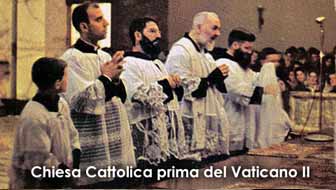
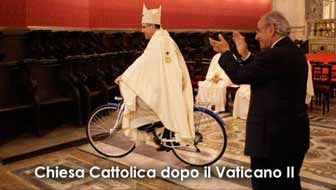
 “The Church is God’s house. It is forbidden for men to enter here with bare arms and wearing shorts. It is forbidden for women to enter wearing trousers, bare headed, with short, low-necked or sleeveless dresses.”
“The Church is God’s house. It is forbidden for men to enter here with bare arms and wearing shorts. It is forbidden for women to enter wearing trousers, bare headed, with short, low-necked or sleeveless dresses.”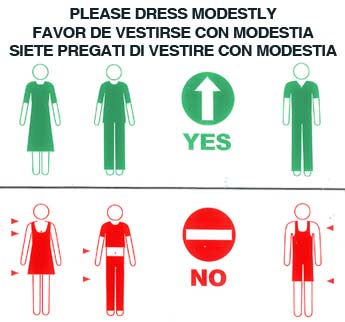
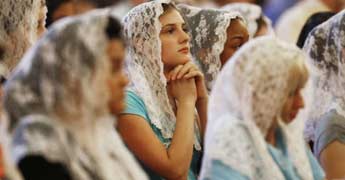
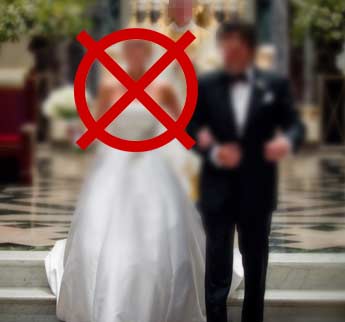
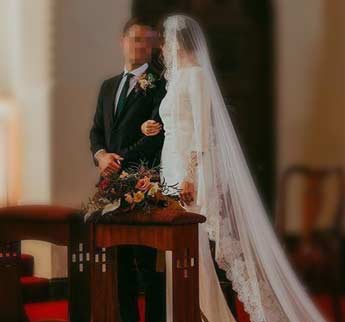
 “Parents, correct the ways if your family, have much dialogue with your children, make time to listen to them as many homes are being lost due to lack of love, dialogue, understanding and most specially for not inviting God. Take God back into your homes, pray my Holy Rosary, as the family that prays together stays together.”
“Parents, correct the ways if your family, have much dialogue with your children, make time to listen to them as many homes are being lost due to lack of love, dialogue, understanding and most specially for not inviting God. Take God back into your homes, pray my Holy Rosary, as the family that prays together stays together.” 




 January 31, 2022 "Heavenly Father, today, I surrender to You my heart. Help me to be Your instrument in the world. Cover me with the Precious Blood of Your Divine Son. Guard me against all evil. Protect me from any evil plan Satan may have for me today. Clothe me in Your Divine Will. Amen"
January 31, 2022 "Heavenly Father, today, I surrender to You my heart. Help me to be Your instrument in the world. Cover me with the Precious Blood of Your Divine Son. Guard me against all evil. Protect me from any evil plan Satan may have for me today. Clothe me in Your Divine Will. Amen"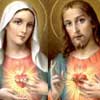 "O Hearts of Jesus and Mary; I consecrate myself, I consecrate my family and the whole world, to your Most Beloved Hearts. Listen to the supplication which I making to you and accept our hearts in Yours, to be delivered and protected we, the whole world, from all evil and all sin. May the protection of your Two Hearts be refuge, strength, and protection, in the daily spiritual struggles. That the power of your Two Hearts irradiates the world so that it is protected from evil and sin. We willingly consecrate ourselves and consecrate all mankind to your Hearts; sure and confident, for your Great Mercy, to obtain the victory over the forces of evil in this world, and the eternal Glory in the Kingdom of God. Amen"
"O Hearts of Jesus and Mary; I consecrate myself, I consecrate my family and the whole world, to your Most Beloved Hearts. Listen to the supplication which I making to you and accept our hearts in Yours, to be delivered and protected we, the whole world, from all evil and all sin. May the protection of your Two Hearts be refuge, strength, and protection, in the daily spiritual struggles. That the power of your Two Hearts irradiates the world so that it is protected from evil and sin. We willingly consecrate ourselves and consecrate all mankind to your Hearts; sure and confident, for your Great Mercy, to obtain the victory over the forces of evil in this world, and the eternal Glory in the Kingdom of God. Amen" "O Virgin of Carmel, may the power of your Holy Scapular take away from me the enemy of my soul; bless me, Mother of Carmel, and deliver me from all evil and danger in this world. I ask you O Mother, that in the hour of my death, your Holy Scapular frees me from the fury of the devil and in the eternity, of the eternal fire. Amen"
"O Virgin of Carmel, may the power of your Holy Scapular take away from me the enemy of my soul; bless me, Mother of Carmel, and deliver me from all evil and danger in this world. I ask you O Mother, that in the hour of my death, your Holy Scapular frees me from the fury of the devil and in the eternity, of the eternal fire. Amen" 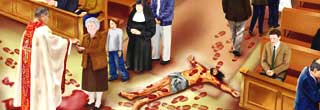
 "Oh Jesus of Divine Mercy, hear my pleadings to you, for I am here to do your Will"
"Oh Jesus of Divine Mercy, hear my pleadings to you, for I am here to do your Will" "O glorious St. Joseph! by your profound humility, by your unalterable meekness, by your invincible patience, by your angelic purity and perfect fidelity that made you a timely imitator of the virtues of Jesus and Mary, I ask you to console me in all my sorrows, to guide me in all my doubts, to defend me in all temptations, to deliver me from all spiritual and material dangers; to extend your arm against all my visible and invisible enemies, breaking and destroying all the snares and barriers that they tend and arm against me. Amen"
"O glorious St. Joseph! by your profound humility, by your unalterable meekness, by your invincible patience, by your angelic purity and perfect fidelity that made you a timely imitator of the virtues of Jesus and Mary, I ask you to console me in all my sorrows, to guide me in all my doubts, to defend me in all temptations, to deliver me from all spiritual and material dangers; to extend your arm against all my visible and invisible enemies, breaking and destroying all the snares and barriers that they tend and arm against me. Amen"  "Oh, blessed Saint Michael, protect us from the attacks and snares of the evil spirits because you know full well that we are poor mortals, fragile and weak, in need of the Mercy of God and of your protection to fulfill the mission that Heaven has commissioned to us. Oh, Saint Michael, may your victorious cry: “who is like God? no one is like God”, suppress and cast into Hell satan and all the evil spirits who prowl about the world seeking the destruction of souls. Amen"
"Oh, blessed Saint Michael, protect us from the attacks and snares of the evil spirits because you know full well that we are poor mortals, fragile and weak, in need of the Mercy of God and of your protection to fulfill the mission that Heaven has commissioned to us. Oh, Saint Michael, may your victorious cry: “who is like God? no one is like God”, suppress and cast into Hell satan and all the evil spirits who prowl about the world seeking the destruction of souls. Amen"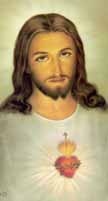 Most sweet Jesus, redeemer of the human race, look down upon us, humbly prostrate before your altar. We are yours and yours we wish to be; but to be more surely united with you, behold each one of us freely consecrates himself today to your most sacred heart. Many, indeed, have never known you, many too, despising your precepts, have rejected you. Have mercy on them all, most merciful Jesus, and draw them to your sacred heart. Be you king, O Lord, not only of the faithful who have never forsaken you, but also of the prodigal children who have abandoned you; grant that they may quickly return to their father’s house, lest they die of wretchedness and hunger. Be you king of those who are deceived by erroneous opinions, or whom discord keeps aloof, and call them back to the harbor of truth and unity of faith, so that soon there may be but one flock and one shepherd. Be you king also of all those who sit in the ancient superstition of the Gentiles, and refuse not you to deliver them out of darkness into the light and kingdom of God. Grant, O Lord, to your Church, assurance of freedom and immunity from harm; give peace and order to all nations, and make the earth resound from pole to pole with one cry: Praise to the divine heart that wrought our salvation; to it be glory and honor forever. Amen.
Most sweet Jesus, redeemer of the human race, look down upon us, humbly prostrate before your altar. We are yours and yours we wish to be; but to be more surely united with you, behold each one of us freely consecrates himself today to your most sacred heart. Many, indeed, have never known you, many too, despising your precepts, have rejected you. Have mercy on them all, most merciful Jesus, and draw them to your sacred heart. Be you king, O Lord, not only of the faithful who have never forsaken you, but also of the prodigal children who have abandoned you; grant that they may quickly return to their father’s house, lest they die of wretchedness and hunger. Be you king of those who are deceived by erroneous opinions, or whom discord keeps aloof, and call them back to the harbor of truth and unity of faith, so that soon there may be but one flock and one shepherd. Be you king also of all those who sit in the ancient superstition of the Gentiles, and refuse not you to deliver them out of darkness into the light and kingdom of God. Grant, O Lord, to your Church, assurance of freedom and immunity from harm; give peace and order to all nations, and make the earth resound from pole to pole with one cry: Praise to the divine heart that wrought our salvation; to it be glory and honor forever. Amen.